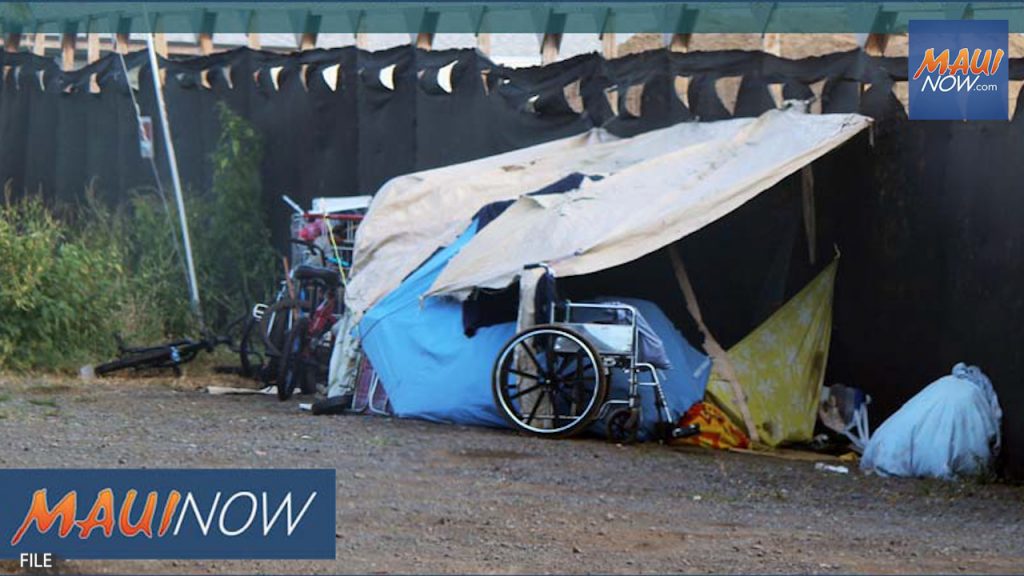House panel recommends passage of bill to prohibit homeless encampments near schools

The House Committee on Human Services & Homelessness advanced a bill Thursday to prohibit homeless encampments near schools.
House Bill 877 would not allow encampments within 100 feet of the property line of a kindergarten through 12th grade public or private school or school facility.
The measure’s legislative finding says that encampments, including tents, makeshift shelters and temporary structures used as shelter “create a complex and pressing problem when close to school grounds.”
“When close to schools, these encampments can threaten the safety, health and overall well-being of students, school staff and surrounding communities,” the bill says. “Encampments can introduce environmental hazards, obstruct public access and pose public safety concerns.”
The committee recommended passage with a vote of 9-0. Voting to advance the bill were committee Chair Lisa Marten and Vice Chair Ikaika Olds and Rep. Sue Keohokapu-Lee Loy, of Hilo; and Oʻahu Reps. Cory Chun, Gregg Takayama, Jenna Takenouchi, David Alcos III and Diamond Garcia. South Maui Rep. Terez Amato voted “aye,” with reservations.
Amato told Maui Now on Friday that she recognizes the importance of safety around schools, but she had reservations because she wanted to ensure that “we act compassionately and legally, not unnecessarily criminalizing an already marginalized population.”
In submitted written public testimony, Superintendent of Education Keith Hayashi supported the bill, saying the department’s overall goal is to maintain a safe and secure environment for all students.
“While the department is committed to fulfilling this goal, it understands there’s a sensitivity concern when relocating displaced people, especially in cases where children are involved,” he said. However, “homeless encampments can be unsafe and violent places.”
Research shows that 23% to 47% of people living in a homeless encampment have a felony arrest on their record, he said. It also shows that 77% have ongoing mental health concerns in relation to depression, substance abuse, antisocial personality disorder, bipolar disorder and schizophrenia.
“The department believes the ongoing concerns at homeless encampments within 100 feet of a school pose a significant safety and security risk for students,” Hayashi said.
He suggested adding pre-K classrooms to the bill’s list of public and private school facilities.
The Department of the Attorney General recommended an amendment to the bill to make violation of its provision a petty misdemeanor, instead of just being subject to “immediate removal.”
“Making a violation of (this) section a petty misdemeanor would allow for the person’s arrest and immediate removal,” the AG’s comments said.
The AG also says that the bill should provide guidance on the disposition of the encampment itself because of due process rights of homeless individuals. The department reminded lawmakers that in Davis v. Bissen, the Hawaiʻi Supreme Court held that “unabandoned possessions of houseless persons constitute property protected by the due process clause of Article I, Section 5 of the Hawaiʻi Constitution.”
In other action, the committee recommended passage of House Bill 1140, which would appropriate $2.5 million in fiscal years 2025-2026 and 2026-2027 to the Department of Land and Natural Resources to clean up after the removal of homeless encampments on state lands under its control.
Among Neighbor Island lands affected, the bill specifically mentions state land near the Kahului Boat Ramp and land along Honoapiʻilani Highway.
In public written testimony, Board of Land and Natural Resources Chair Dawn Chang strongly supported the bill, saying that it would mean the department would not need to diverted limited operating funds to address the need to clear homeless encampments on department lands.
“The department regularly cleans about 22 sites, the majority of which – 20- are on Oʻahu, with two sites on Maui,” she said. “In addition, Kauaʻi has scattered sites that are not on a regular rotation as the camps are not always occupied. Hawaiʻi Island is also not cleaned regularly, although complaints about the areas around Wailoa River are increasing. In general, campsites on department lands are difficult to access, and labor-intensive to clean.”
The bill says that in fiscal year 2023-2024, DLNR with help from the Department of Transportation cleaned up homeless encampments of about 223 people in 24 locations. At least 129 days were spent cleaning, with many efforts taking a number of days because the clean-ups involved sizable amounts of waste and debris.
The committee voted unanimously for passage, with Amato, again, voting “aye,” with reservations. She said she wants to help solve the problem of cleaning up areas, but she also wants assurance from DLNR that it will act safely during clean-ups.
Amato, however, cast the sole dissenting vote on House Bill 1486, which would make it a disorderly conduct offense to remain or loiter within 20 feet of a bus stop with no intent to use any bus service.
Amato said she heard the concerns raised by the state Office of the Public Defender regarding questions of intent, and “I voted ‘no’ to flag the bill for the Judiciary Committee to analyze (and) ensure the Legislature acts legally and constitutionally to uphold our oath of office.”
The bill would authorize law enforcement officers to immediately remove any person committing the offense and confiscate their personal property. It also permits law enforcement officers to determine if confiscated property should be saved or discarded.
The measure includes a legislative finding that homeless issues in Hawaiʻi have reached a “critical level, often making it dangerous for everyday citizens to go about their business.”
The bill says homeless individuals have occupied entire bus stops, making it their place of residence.
“In some cases, entire bus stops are enveloped with personal property, displacing riders as they wait for their bus, including kupuna who are forced to remain standing and fully exposed to the elements while they wait,” the bill says. “The Legislature believes that bus stops must remain clear in order to maintain the safety for all involved.”
The state Office of the Public Defender submitted testimony opposed to the bill, saying it would be impossible to enforce and would attempt to solve the “homeless problem” through a criminal justice system ill-equipped to do so.
“This bill is clearly meant to target those individuals who choose to occupy bus stops in lieu of other shelter options,” the Public Defender Office said in written testimony. “However, using the criminal justice system (arrest, charging and incarceration) to deter the unintended use of bus stops is not a practical way of resolving this ‘problem.’ “
The office said people who choose to improperly occupy bus stops do so because they have no other housing options or have economic, emotional or psychological issues that “leave them with little choice or good decision-making.”
“The problems of homelessness and mental illness are social issues and not issues of crime,” the office said. Also, “in practical terms, it would be impossible for this law to be enforced, as police officers finding someone sleeping at a bus stop, would not be able to determine if said person was waiting for the bus, or just taking a nap.”
Michael EKM Olderr strongly disapproved of the bill. “This anti-humane bill would continue the trend of criminalizing people who, through no fault of their own, can’t find a place to sleep at night,” he said.
Other residents submitted testimony in favor of the bill, saying it would help make bus stops safer.
The Honolulu Police Department supported the bill, along with the administration of the City & County of Honolulu.
Editor’s note: This story has been updated from its original post to include comments from South Maui Rep. Terez Amato.







